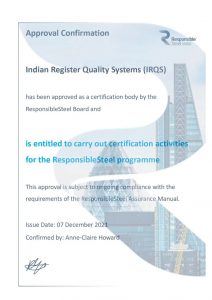Introduction
In an age where sustainability is no longer a luxury but a necessity, industries like steel are at the crossroads of transformation. Once seen as the heavyweight champion of pollution, the steel sector is slowly—but surely—starting to pivot towards greener practices. And here’s the thing: it’s not just about making less of a mess—it’s about forging a future that is as strong as steel, but a whole lot cleaner. Enter IRQS (Indian Register Quality Systems), a key player in leading this shift by promoting ResponsibleSteel certification.
You might be wondering, “Steel? Responsible? Really?” Well, yes. While steel has long been associated with environmental challenges, IRQS is proving that it’s possible to produce this essential material in a way that reduces carbon footprints and promotes social responsibility. By driving forward ResponsibleSteel certification, IRQS ensures that steel producers not only meet rigorous environmental standards but also respect the people and communities around them.
What is ResponsibleSteel Certification?
Alright, let’s dive into the details. So, what exactly does “ResponsibleSteel” even mean? It’s a global initiative that pushes for steel manufacturers to meet high environmental, social, and governance (ESG) standards. But let’s not get bogged down in corporate jargon. ResponsibleSteel certification is essentially a stamp of approval that tells the world: “This company cares about more than just making money—it’s committed to making a positive impact on the planet.”
The certification looks at several critical factors, all of which can make your head spin if you think about them too long. But don’t worry, we’ll keep it simple:
Environmental Management: This is the big one. ResponsibleSteel certification looks at how much energy the plant uses, the waste it generates, and its carbon emissions. It’s all about cutting down on the environmental damage while producing top-notch steel.
- Social Responsibility: No one wants to work in a factory where safety is an afterthought or where workers aren’t treated with dignity. The certification ensures that labor practices are fair, safe, and that the community around the plant is positively impacted. It’s the human side of sustainability.
- Governance: Transparency is key. This part ensures that the business is running ethically, following international standards, and is open about its operations.
What makes this certification stand out is its holistic approach. It’s not just about reducing emissions or recycling scrap metal (though those things are important). It’s about ensuring the entire process—from extraction to production—meets high ethical standards. So, when a steel company gets this certification, it’s not just bragging rights; it’s proof that they are genuinely committed to improving their environmental and social footprint.

Why IRQS Leads the Charge in ResponsibleSteel Certification
Now, let’s talk about why IRQS is the perfect partner for steel companies on this sustainability journey. With decades of experience in the certification game, IRQS is known for pushing industries to meet and exceed global quality standards. But it’s not just about issuing certificates. IRQS plays a crucial role in guiding companies towards a sustainable future—one step at a time.
Let’s be honest: the road to responsiblesteel production isn’t always an easy one. The process can be complex and often requires businesses to rethink their entire approach. But this is where IRQS comes in. They provide steel manufacturers with the expertise they need to navigate the maze of environmental regulations, social expectations, and governance principles. Think of them as the trusted GPS in a world full of winding roads.
One of the standout features of IRQS’s approach is its emphasis on tailored solutions. While many certification bodies offer one-size-fits-all services, IRQS takes the time to understand each steel producer’s unique challenges and opportunities. This customized guidance ensures that manufacturers not only comply with ResponsibleSteel standards but also improve their operations in a way that’s sustainable for the long term.
What really sets IRQS apart is their deep commitment to Indian industries. As the country’s manufacturing sector expands, the need for sustainable practices has never been more pressing. IRQS recognizes this urgency and offers a certification program that aligns with international standards while being sensitive to the local context. After all, what works for a steel plant in Europe might not necessarily work in India. With IRQS, companies get a roadmap that’s designed to fit their specific environmental and social landscape.
The Benefits of ResponsibleSteel Certification for Steel Manufacturers
You might be wondering, “Okay, but why should steel manufacturers even care about getting certified?” Great question—because this certification doesn’t just look good on paper. It has real, tangible benefits for businesses:
Improved Brand Image: Consumers (and, let’s face it, shareholders) love a company that’s seen as environmentally responsible. Being certified as a ResponsibleSteel producer can give a company a competitive edge, helping it stand out in a crowded market.
- Access to Global Markets: As sustainability becomes a major driver in international trade, companies with ResponsibleSteel certification have a better chance of meeting the requirements of global clients, particularly those in regions with strict environmental standards.
- Operational Efficiency: The certification process itself encourages companies to streamline their operations—cutting waste, reducing energy consumption, and improving overall efficiency. In other words, it’s not just about being good to the planet; it’s also about saving money.
- Risk Mitigation: With growing global attention on environmental and social governance, being certified can help steel manufacturers avoid fines, lawsuits, or damage to their reputation from not adhering to regulations.
The Path Forward: IRQS’s Role in a Sustainable Future
It’s clear that the steel industry has a long way to go on its journey toward full sustainability. But with organizations like IRQS leading the way, the road is becoming a little less bumpy. The future of steel manufacturing is all about striking a balance between growth and environmental stewardship—and IRQS is helping make that possible.
As more and more steel producers step up to meet ResponsibleSteel certification standards, we’re likely to see a ripple effect across industries. Companies outside of steel, from construction to transportation, will follow suit, creating a more sustainable and socially responsible global supply chain.
In the end, it’s not just about producing steel—it’s about building a legacy that future generations can be proud of. With IRQS guiding the way, steel manufacturers can confidently move towards a greener, more responsible future. And hey, if steel can go green, who knows what’s next?
Conclusion
Sustainability in the steel industry isn’t just a trend—it’s the future. With leaders like IRQS driving the charge for ResponsibleSteel certification, manufacturers have the tools they need to meet the growing demand for sustainable practices while maintaining high standards of quality and safety. Whether you’re a producer looking to make your operations greener or a consumer seeking ethically produced steel, IRQS is helping to forge a path toward a more responsible, sustainable world.





